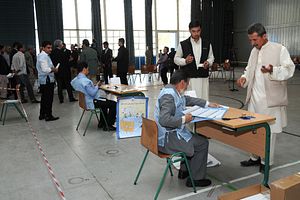As a post-conflict country, Afghanistan experienced its first democratic elections in 2004 and 2005, with overwhelming support from the international community. However, the electoral system still needs to be developed in order to ensure transparency. The existing flaws have resulted in prolonged instability and further weakened the legitimacy of the government. This raises more concerns, especially as the 2018 parliamentary elections are just around the corner.
According to research by the Afghanistan Research and Evaluation Unit (AREU), the simple logic of “competitive elections” does not exist in Afghanistan’s electoral process. Therefore, “in their current manifestation, elections have the potential to destabilize” the country. Moreover, research from the U.S. Institute of Peace (USIP) on countries with upcoming elections shows that applying the appropriate set of policy instruments could “address the underlying drivers of conflict” when it comes to electoral violence. Otherwise, vulnerable citizens and communities will remain exposed to the undeniable threat of conflict.
The Afghan government and the international community need to make profound changes to widely revive the credibility of the electoral system, and in the meantime lower the potential of further destabilization as a result of upcoming elections.
Following the Bonn accord on December 5, 2001, and approval of the constitution for the Islamic Republic of Afghanistan on January 4, 2004, the final milestone for providing a legal framework for the state structure was conducting free and fair elections. This constitution and the first elections were expected to lead the country toward a fully representative government. Since then, the country has seen a national government emerge from elections and experienced very initial but shaky steps toward democratization.
However, researchers suggest that holding “early elections” in most post-conflict countries with weak rule of law tends to reignite violence by empowering former combatants rather than liberal, programmatic political parties. Elections in countries like Afghanistan “often take place when the rule of law is weak, making it more likely that elections will suffer from irregularities, candidates will resort to illiberal populist appeals, and losers will refuse to accept the results peacefully.”
Given the prevailing challenges — including insecurity, widespread corruption, and unemployment — free and fair elections in Afghanistan could play a vital role to ensure the survival and sustainability of the government, whose legitimacy is already under question. Widespread corruption and the technically weak processes, coupled with a lack of reforms, laid down the foundation for an ever-weakening electoral system. All the following elections were conducted with increasingly incidents of fraud, which caused people to lose trust in the electoral process and institutionalized a corrupt system in the country. Furthering these flaws by conducting the upcoming election under the current system could only sink the government into even deeper trouble.
Recent USIP research suggests that both the 2014 presidential elections and the parliamentary elections that were originally scheduled for 2015 along with “the failure to implement real electoral reform thus far in the country suggest serious challenges for electoral democracy and the perceived legitimacy of Afghanistan’s National Unity Government.” The respondents of the research survey say they feel more distance between them and the government since the 2014 elections. That is mainly due to the failure of elections to produce legitimate outcomes in both the presidential and parliamentary/provincial council elections. The research survey concluded, however, that the concept of elections as a tool for electing the president and other officials still has widespread acceptance in Afghanistan, and the people do not want any other alternatives (such as the president being selected via a Loya Jirga).
AREU researchers concluded that both the Afghan government and the international community did not pay enough attention to the reality that elections can lead to increasing instability and further isolation of local communities. In in 2010, the government and the international community insisted on conducting elections despite the existing instability in the country. However, the polls encouraged more public debate in local politics and lacked “a coherent vision of how to create a stable and transparent political system.” AREU argued that, in spite of the importance of elections to the common people, the candidates cannot compete as they should in an established democratic system due to widespread insecurity. Moreover, the government and international community could not guarantee transparency in the elections.
Previous experiences have proved that elections in Afghanistan lead to both instability and further reinforcing of the existing non-transparent or corrupt system. As the result, the state faces further instability challenges and the people lose their faith in both the system and the election process, to the point that the respondents to the survey called the 2010 elections in Afghanistan “a mistake.”
There are also technical critiques of the electoral system in Afghanistan, especially the Single Non-Transferrable Vote system that allocates a special quota for women. The system was chosen during the early steps toward institutionalizing the current type of government. But after the 2005 election, many felt the need for its reform in order to fit Afghanistan’s context. Some reform alternatives have been introduced during the last few years. Drafting the new Electoral Law in 2012-13 encouraged some potential reforms but the effort largely failed. After passing the law with some minor changes, Afghanistan proceeded toward another round of flawed elections.
Now, as the parliamentary elections approach and the country undergoes a difficult time in terms of stability and legitimacy, the Afghan government and international community need to consider the most feasible reforms. Otherwise, the July 7, 2018 parliamentary election – originally scheduled for October 15, 2016 – will further loosen the already shaky pillars of the government.
Abdullah Elham works with the BBC World Service as a producer and is a student at the American University of Afghanistan.

































